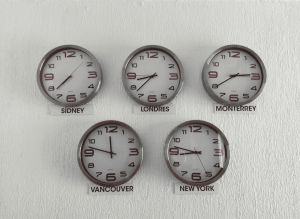Imagine every moment of your waking life had a dollar value attached to it. You roll out of bed at 7 a.m., which is $7 into your time account. You sip your morning coffee for 30 minutes while scrolling aimlessly on your phone, which is another $30 out of your account. Then you are stuck in traffic on your way to work. Every minute is taking money out of your account, and you are worried about it.
This is what your life would look like if time was literally money. But should we ascribe financial value to the currency of moments and hours to prioritize how we spend it? What will change about the society if we make time equal to money. Would it make you happy as a person? Read on, and let’s find answers to all these questions.
Considering Time as a Limited Resource
Many great philosophers have reflected on the ephemeral nature of time and the need to spend it wisely. Seneca, the Roman Stoic thinker, urged people to treat time as a precious resource, saying, “As if you were on the point of death, be saying to yourself each hour: I have to die.”
The ancient Greek historian Polybius believed that “time is the currency that we pay for objects and actions.” Hundreds of years later, Benjamin Franklin famously wrote, “Dost thou love life? Then do not squander time, for that’s the stuff life is made of.”
These influential minds understood time as a valuable but limited asset. Every hour that passes can never be retrieved. Thus, people must deliberate how they trade their irreplaceable time for various life activities. Attaching a monetary value could incentivize better time stewardship.
We continue to work to grow our financing wealth. This is where you need to consider time as money. Then, you will need to harvest more meaningful use of every single second you spend.
How to Prioritize Passion Over Profits
If you examine the relationship between money and fulfillment, you will notice that it is uneven. For example, let’s assume that you earn $75,000 a year. Getting a raise would improve your daily happiness. But what truly seems to enrich life is pursuing passion, purpose, and the people you love.
When you look at the “Money Equals Time” scenario, we are more likely to see mass career changes as the reward. However, you should also look at other things you could do if you had more time. For example, you can spend that time on creative projects, travel adventures, and community service. You can also use time to spend quality time with your family or friends. They will eventually help you boost your mood and satisfaction.
Society would cultivate whatever gave meaning rather than focusing solely on what monetarily pays. Of course, passions still require effort, discipline, and skill building – all of which require investing time. But if you knew each hour spent toiling solely for a paycheck was draining irreplaceable money from your lifespan, you’d likely quit uninspiring work to follow endeavors that lit you up inside.
Income Inequality and Societal Problems
Envisioning time as equivalent to money can also raise numerous philosophical quandaries. For example, our society requires certain tedious jobs to function. Imagine what would happen if every one of us quit our jobs to find bliss. It would cause critical infrastructure to collapse.
On the other hand, certain job roles, such as healthcare assistants, sanitation workers, and teachers, are some of the lowest paid jobs as of now. They would abandon their jobs unless salary ceilings were abolished. They would prefer to work only if there was an equalized pay rate.
Essentially, “time equally money” thinking, taken to the extreme, leads to socialism and universal basic income so people can freely pursue purposeful activities rather than work solely for survival.
Additionally, monetizing time exaggerates existing inequalities. Unemployed individuals already struggle with endless empty hours they can’t exchange for money in our current system. The poor must trade more grueling time for dollars just to afford life’s basic necessities, while the wealthy already control abundant money-time freedom. So, this model only widens the chasm between leisure-rich and time-poor classes unless balanced by resource redistribution policies.
Appreciating the Time We Have
At any time of day, we should all learn to appreciate the time we have. Making time equivalent to money will jolt people into more intentional spending of their lifespans. It’s easy to fritter hours distracted while assuming we have unlimited ahead for meaningful pursuits sometime later. But reflecting on time’s fleeting nature inspires squeezing joy from the current moment.
What would be the ideal solution to overcome this? Perhaps the solution lies not in literally equating time to money. It would risk commoditizing life in an uncomfortably capitalist way. However, it would be better to maintain an underlying acknowledgment that this day only comes once. Then how would you wish to spend it?
What would leave you feeling fondest at day’s close? As Seneca wrote, “You act like mortals in all that you fear, and like immortals in all that you desire.” In other words, we waste our time worrying about endless futures we aren’t guaranteed.
Final Words
Money is not linked to our heartbeats. Instead, we would notice that time is more connected to our soul. We consider time as something finite by nature. However, we also realize that it is infinitely precious.
If you have the next moment, you will have the ultimate currency to acquire meaning, depth, and purpose. That’s something you can invest in consciously right now. There is no need to do a dollar conversion for it. The choice to do that is totally yours.
So, how will you spend this instant before it slips away and becomes a part of your memory? Only you can decide.






